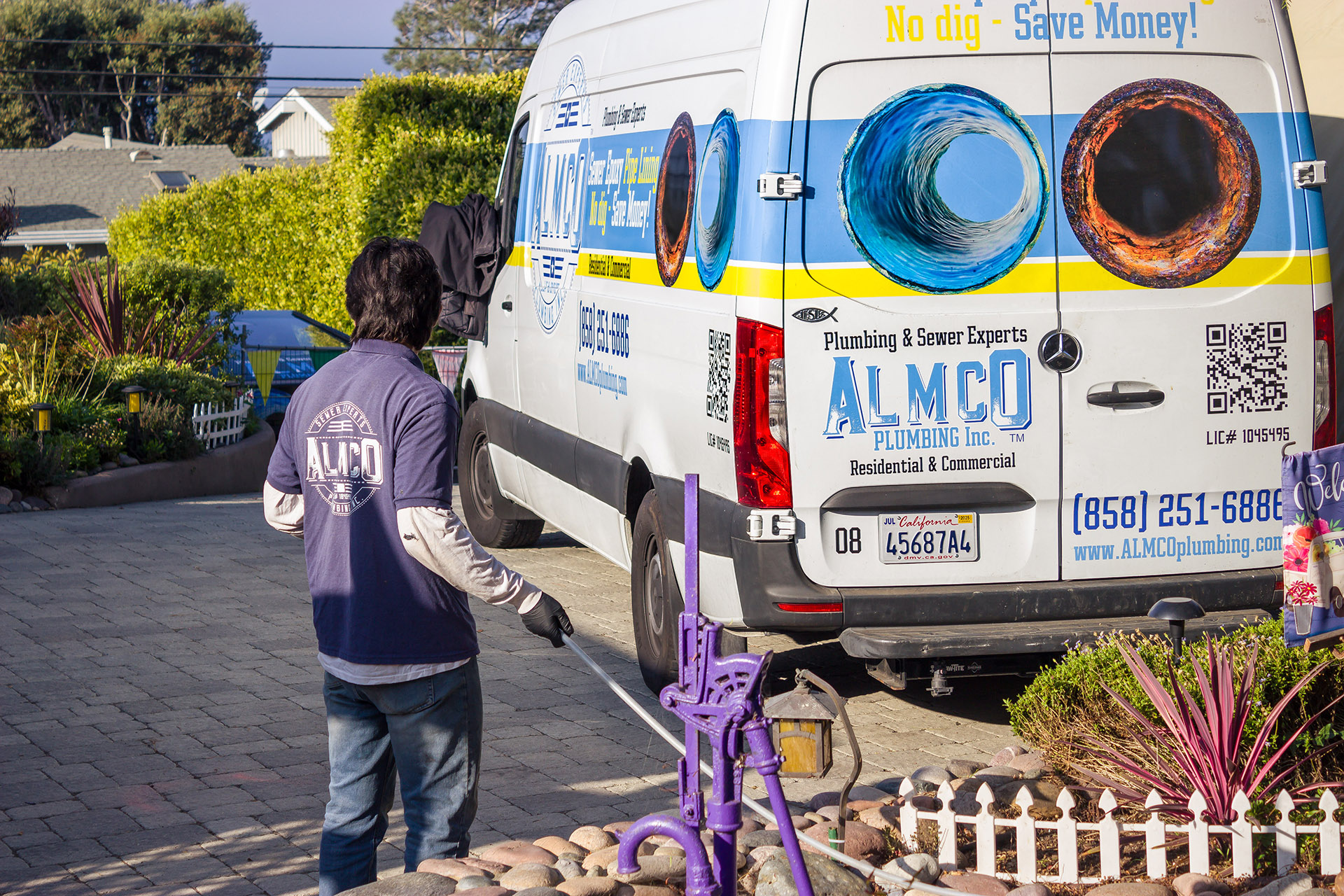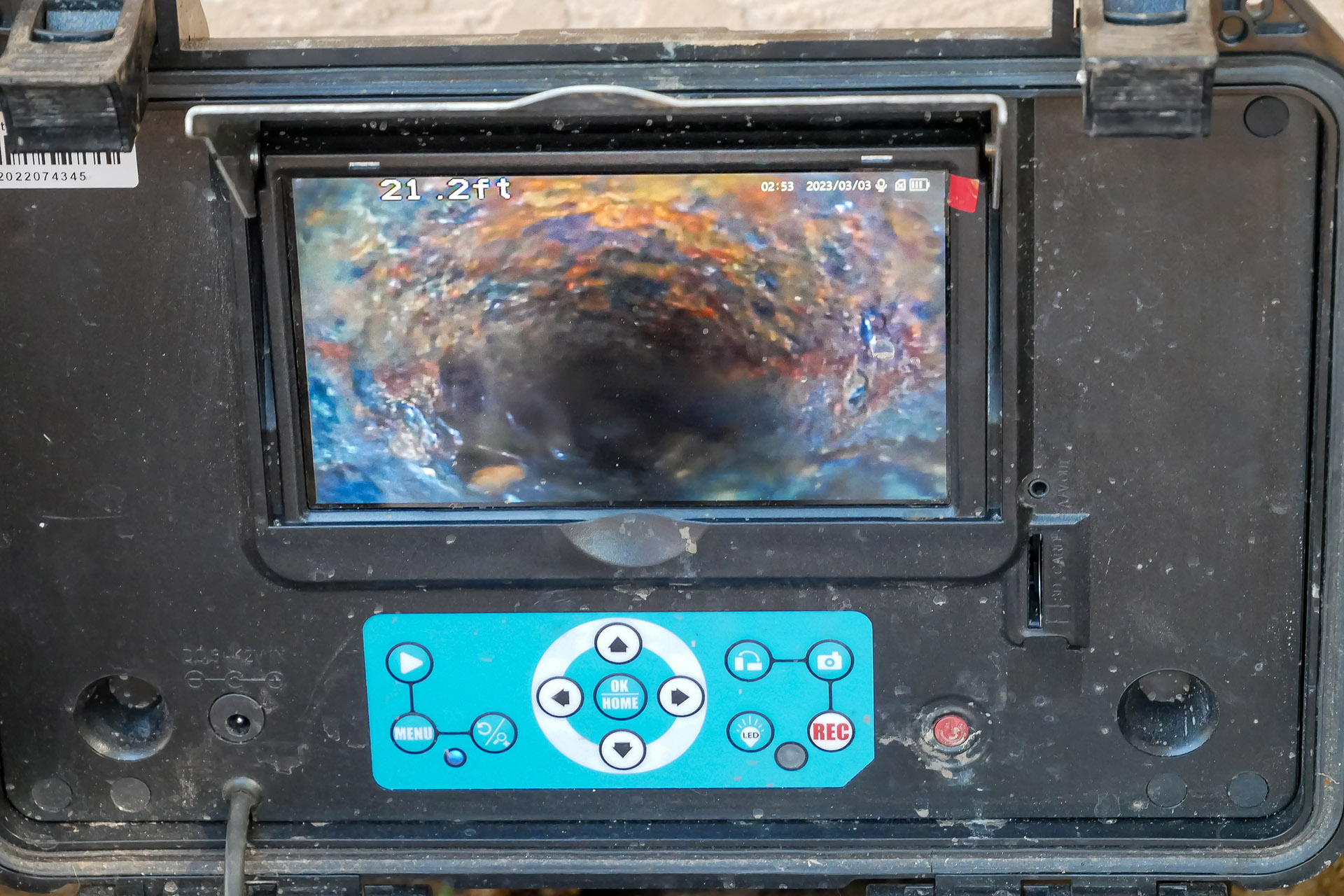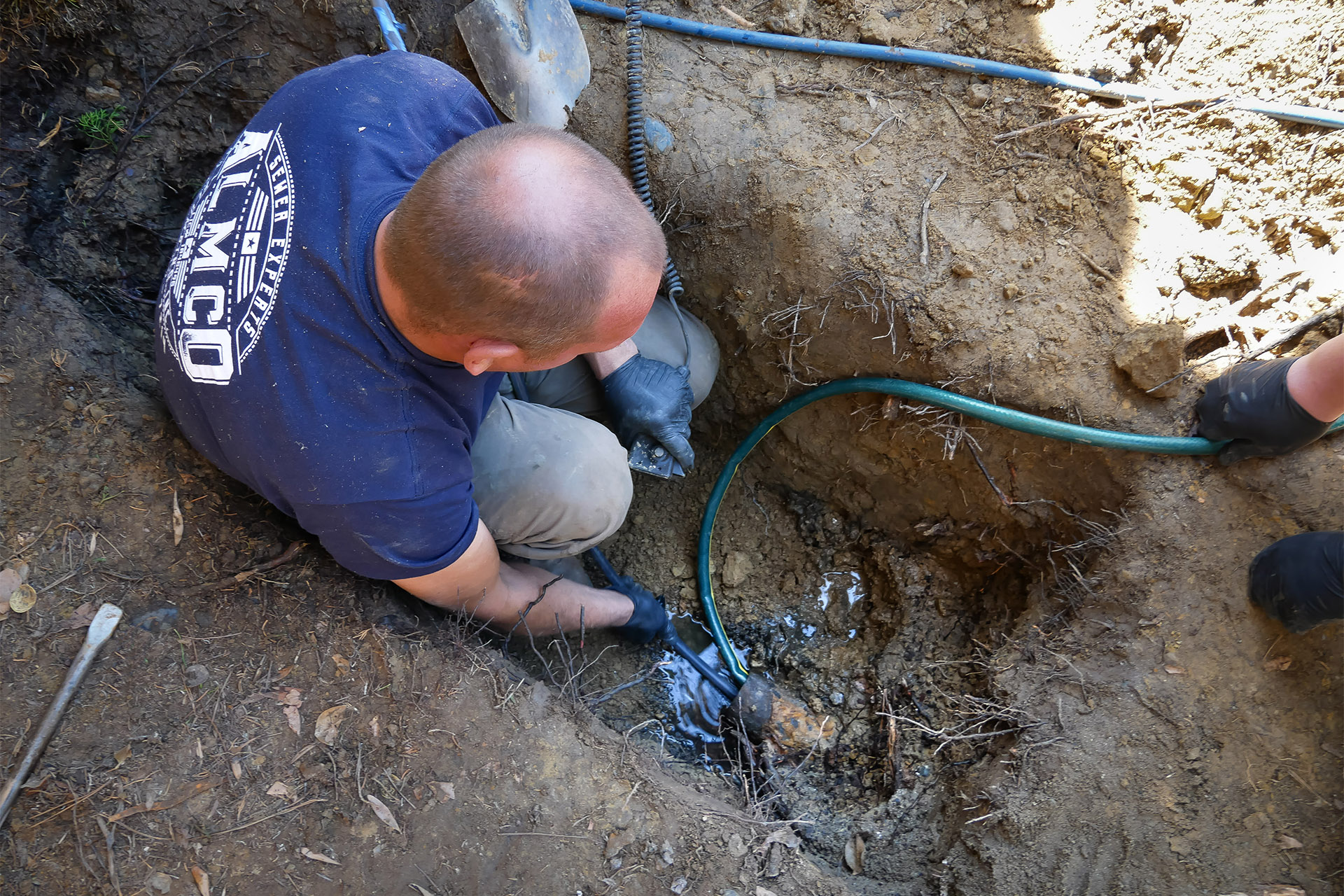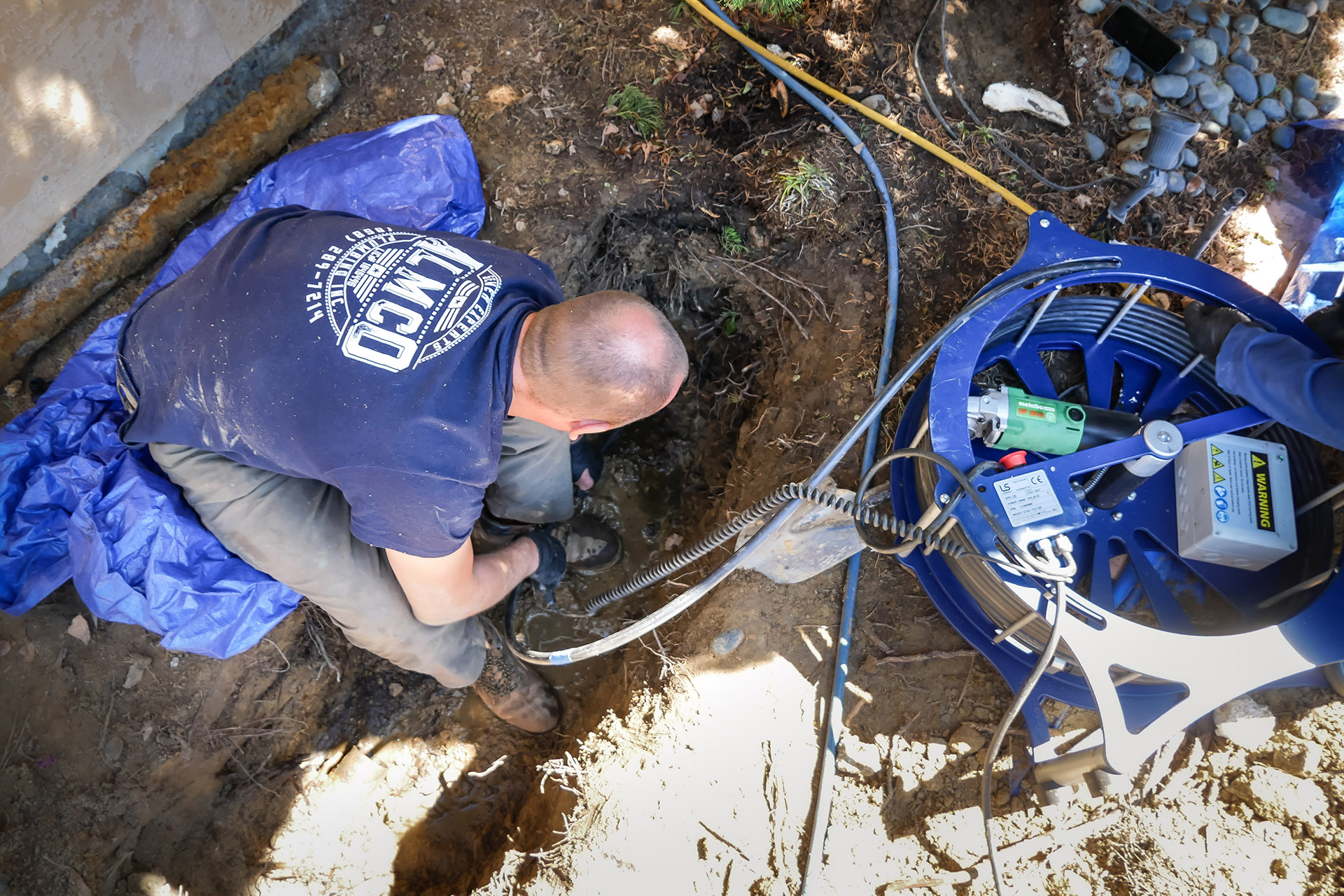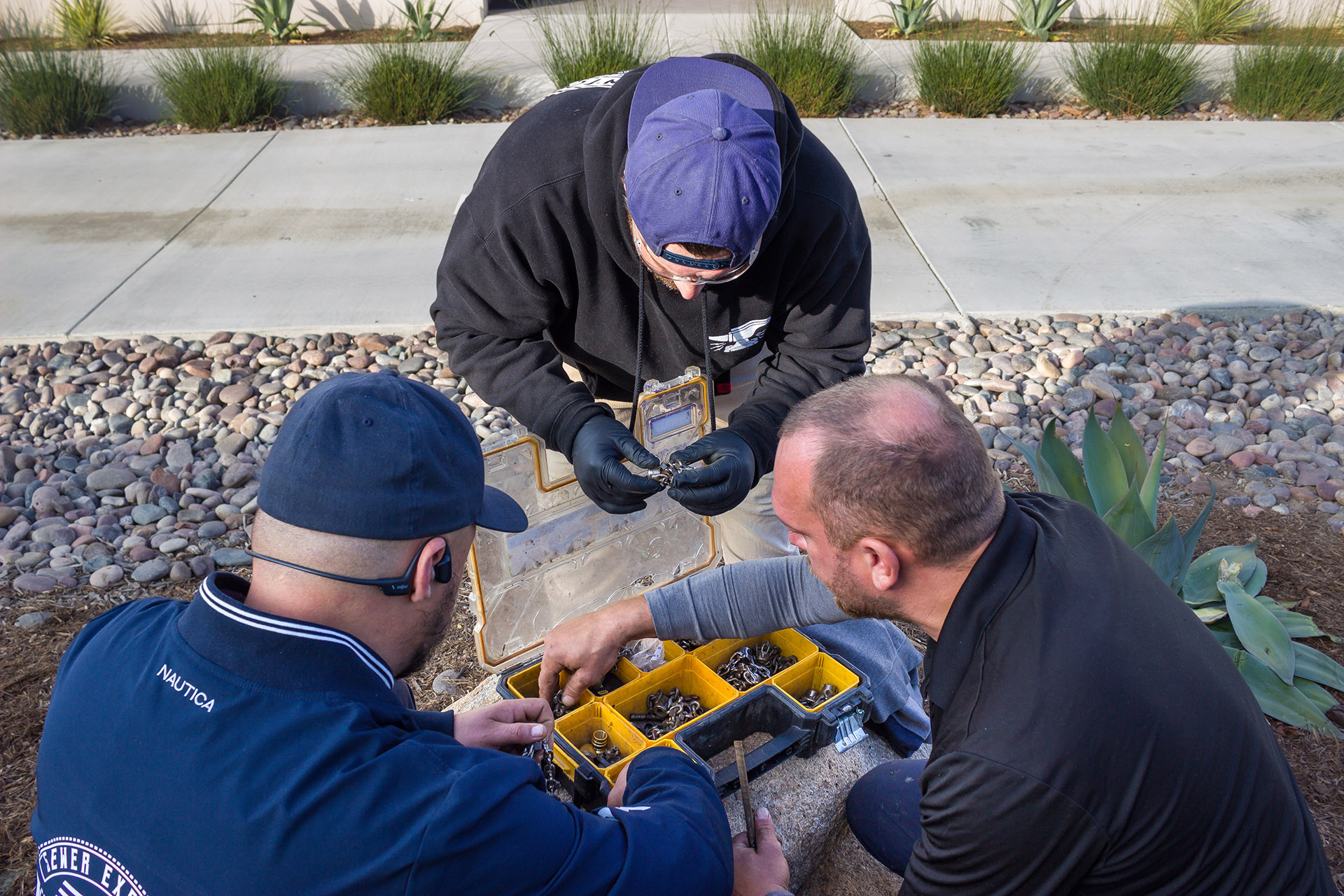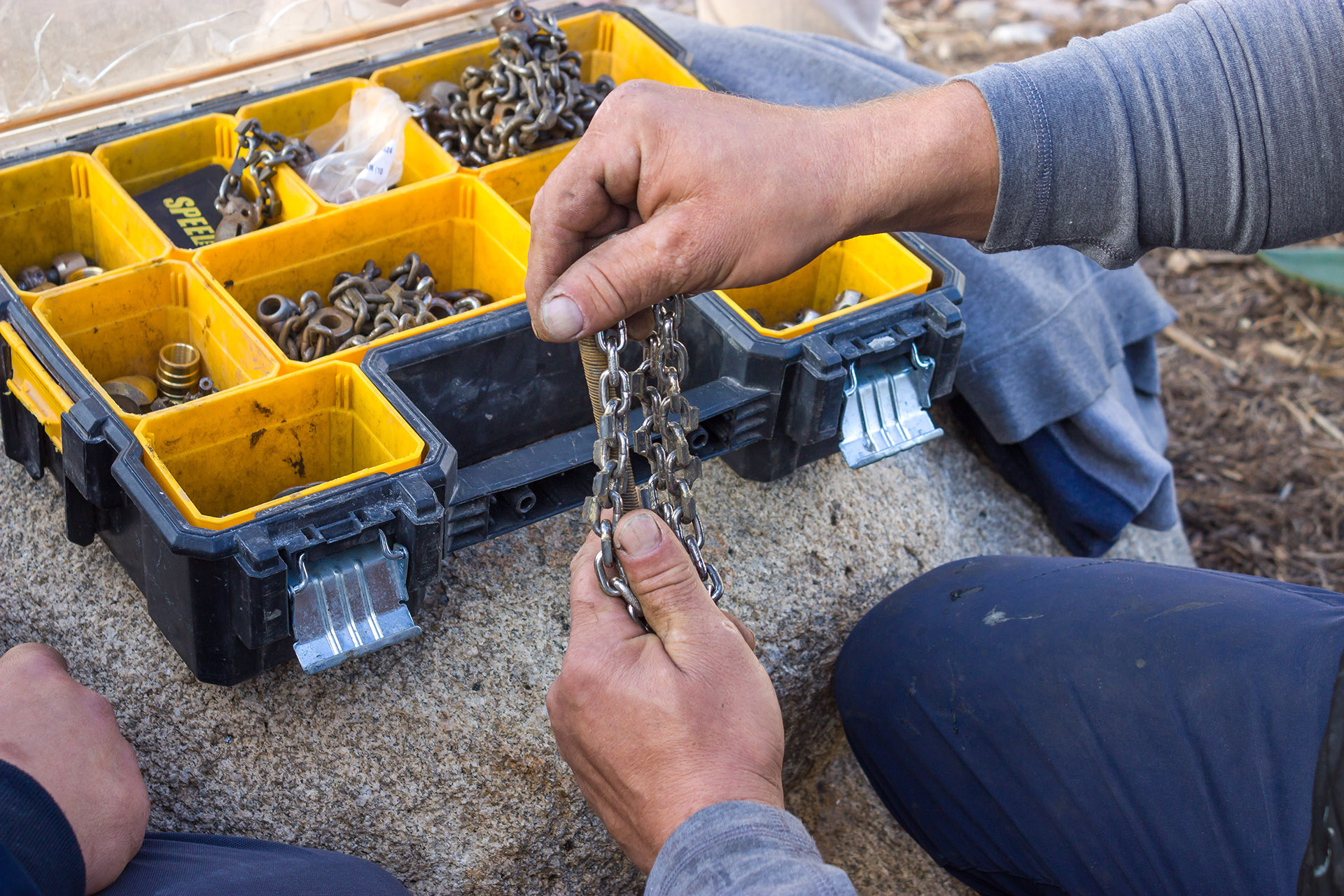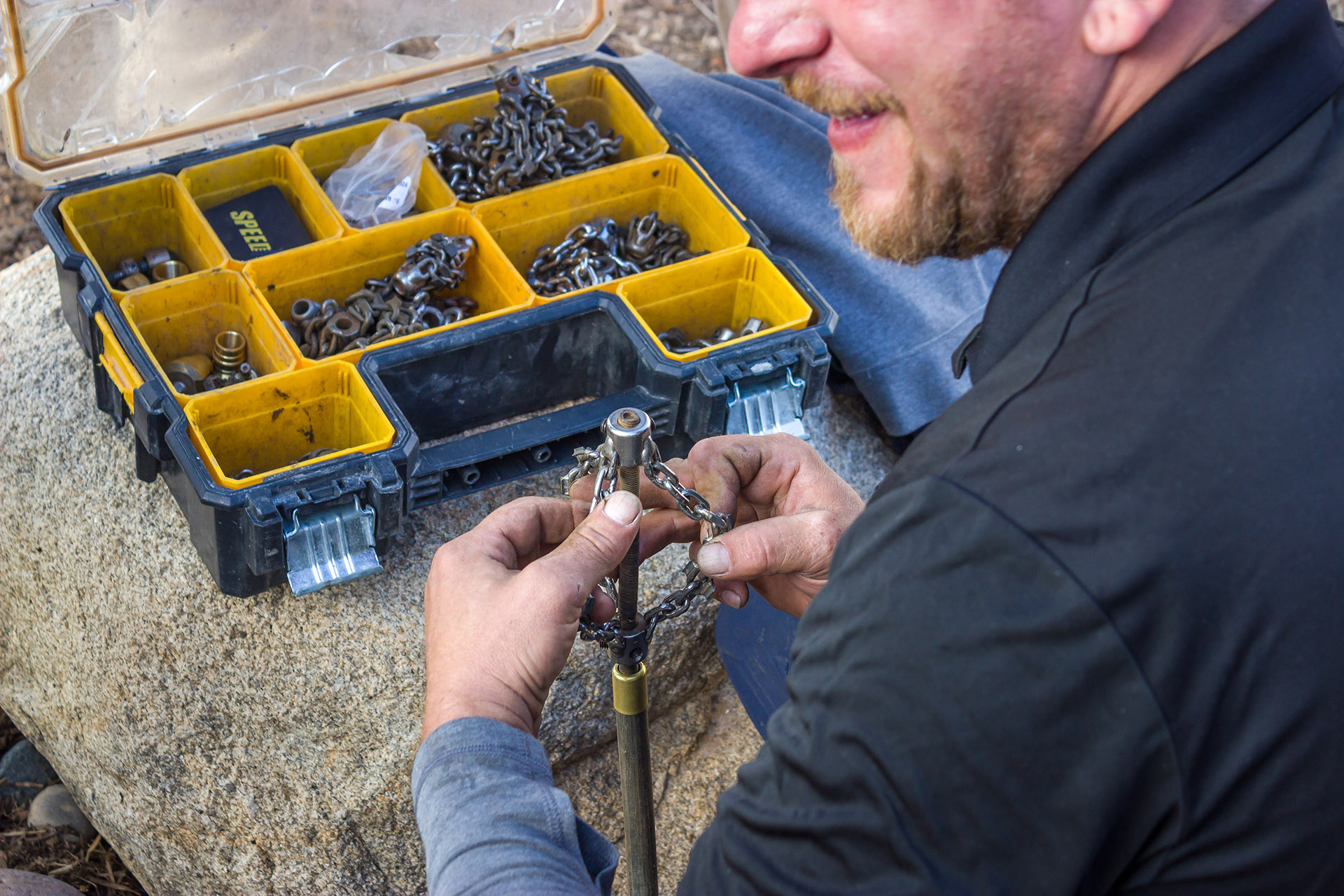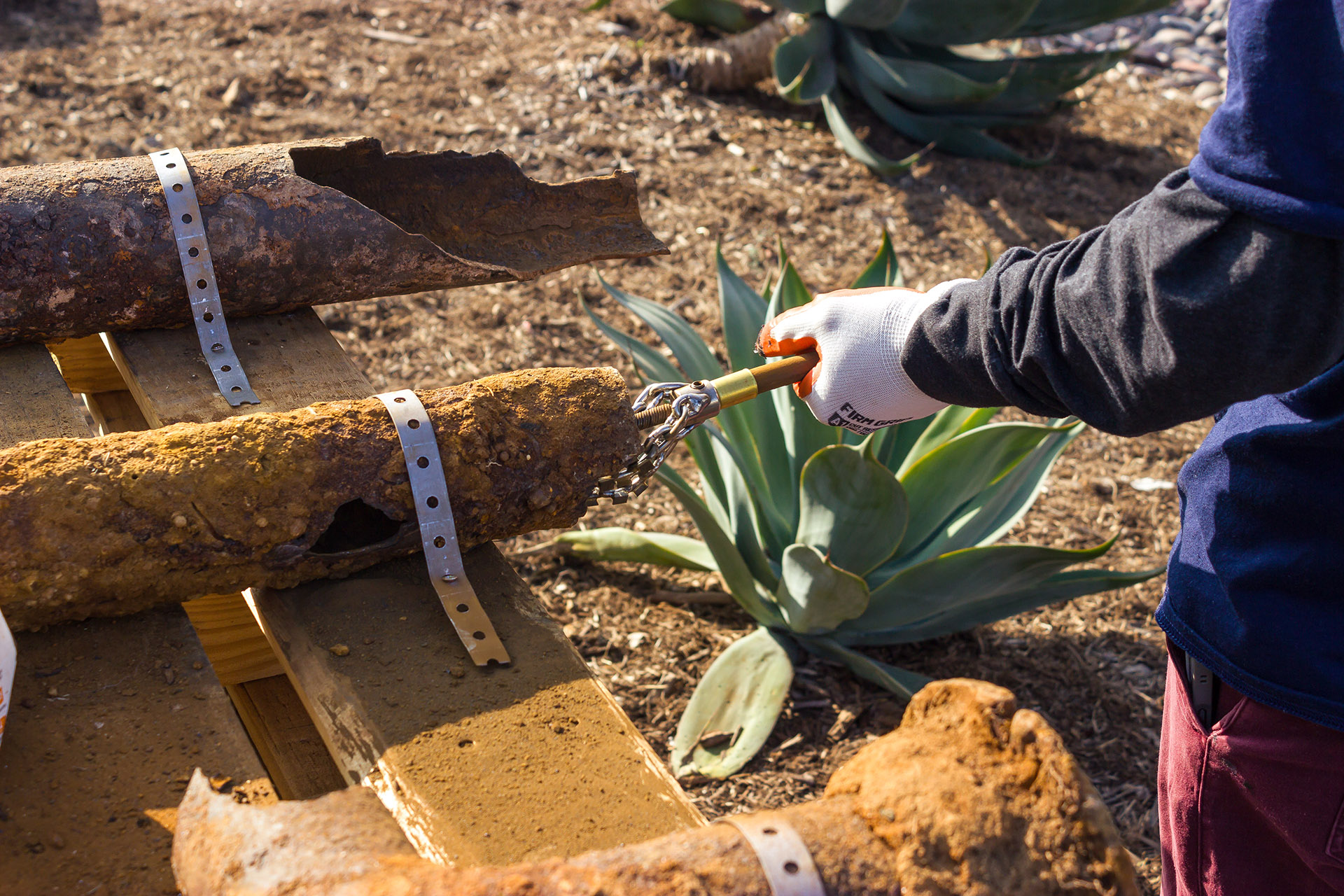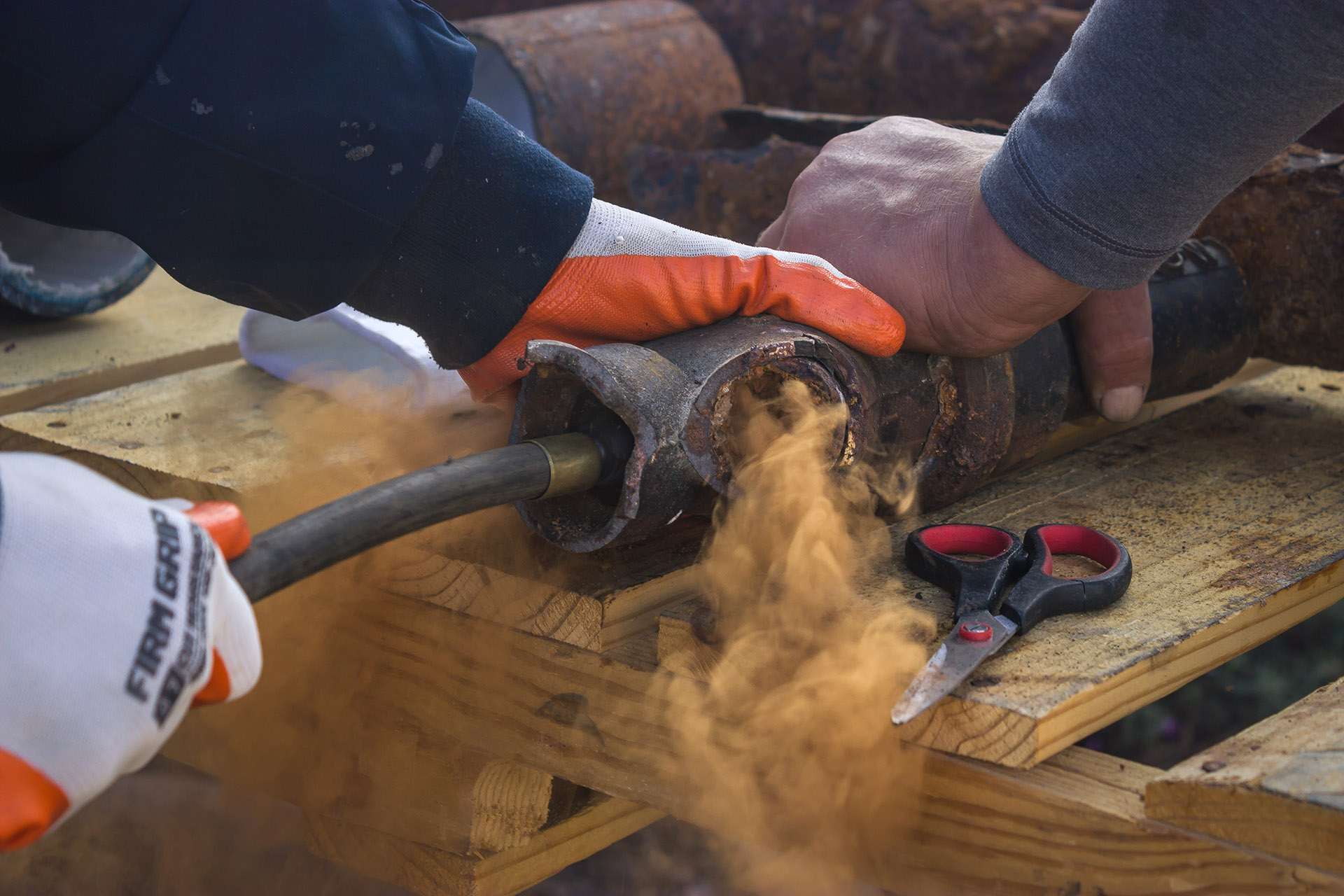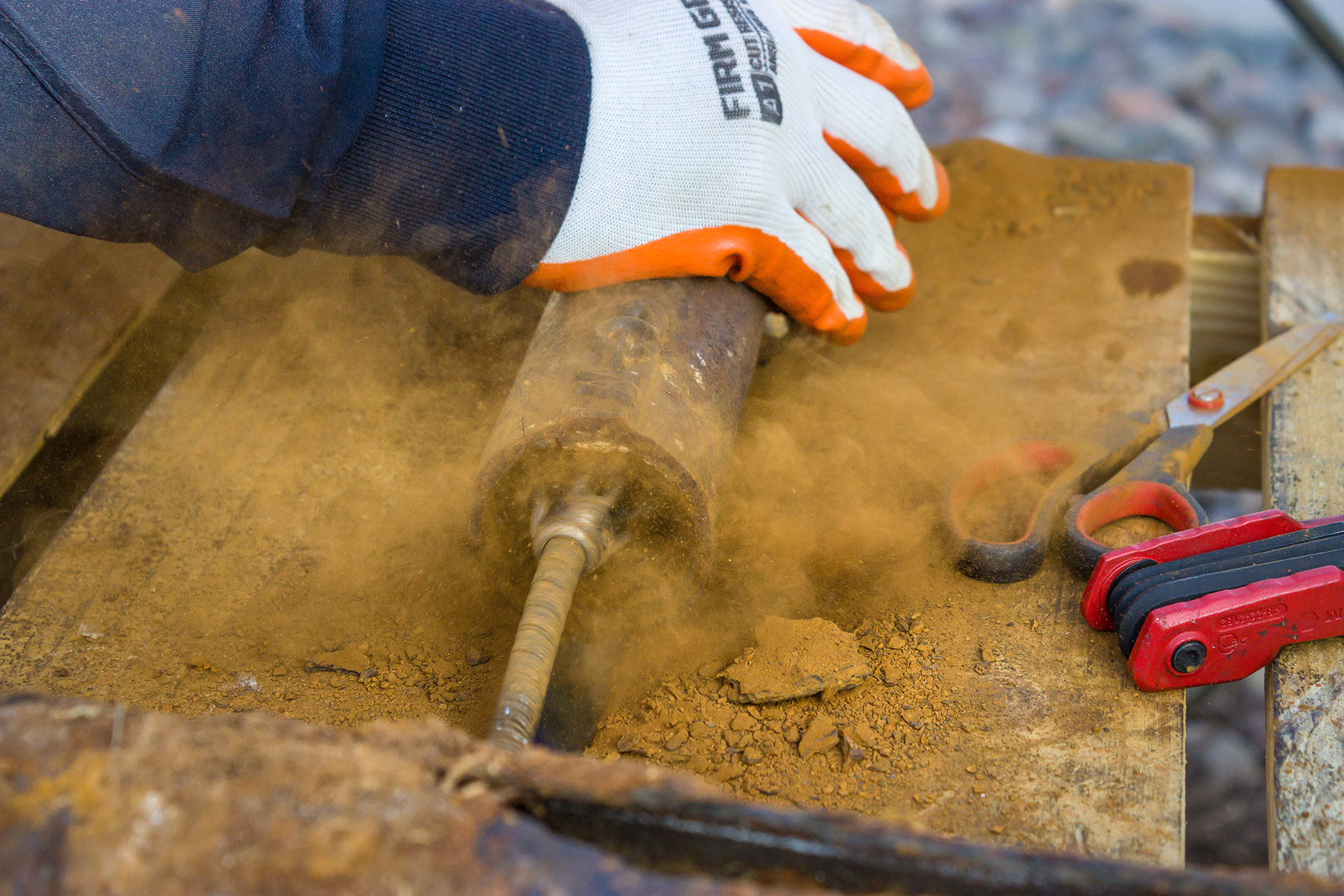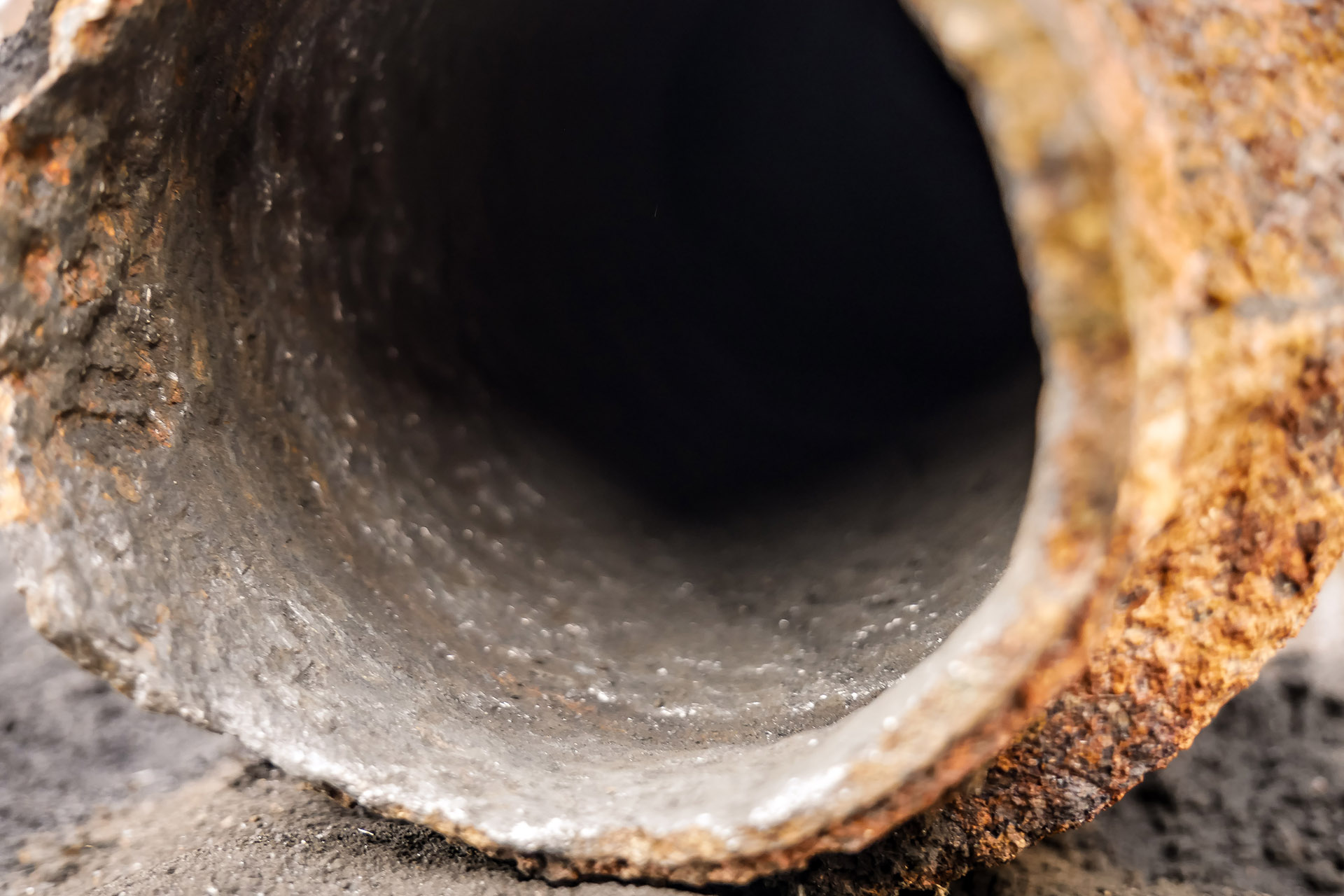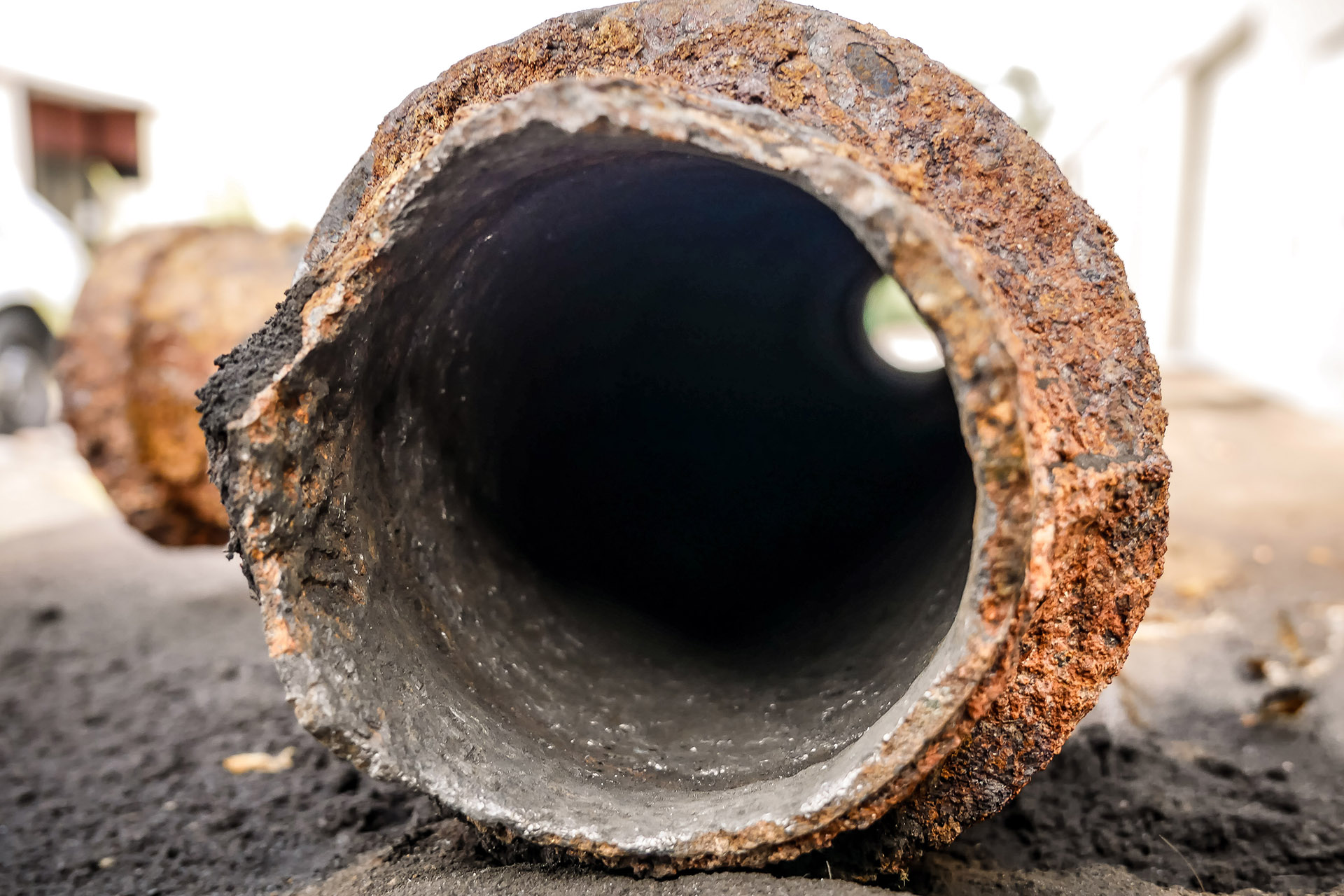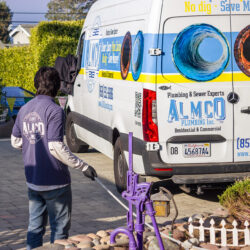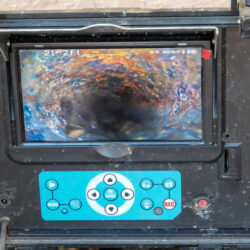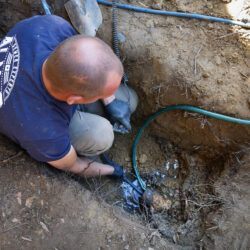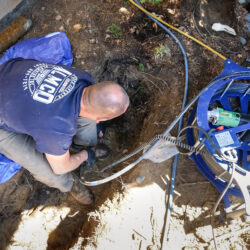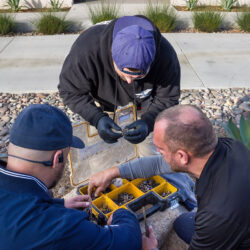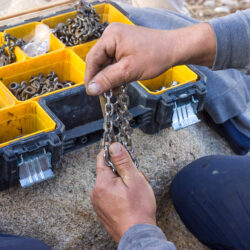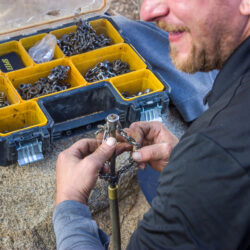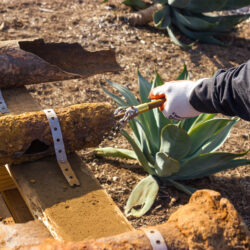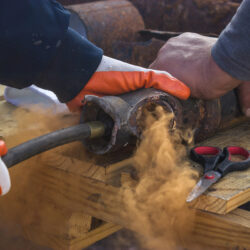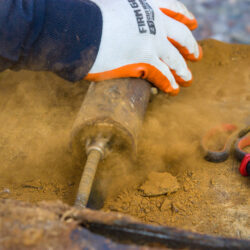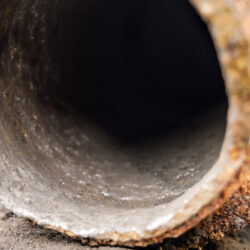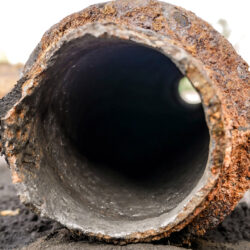Carbide Chain Descaling Service: Process Step-by-Step, Pros & Cons, Price in San Diego, CA
Carbide chain descaling (sometimes referred to as “picotte the pipe” by some plumbers) is an effective method for restoring the interior of aging or clogged pipes. Over time, mineral deposits, corrosion, grease, and other buildups can significantly reduce pipe diameters, limiting flow capacity and increasing the risk of blockages. A carbide chain descaler removes these deposits, leaving pipes clean and functional—without the need for trench digging.
At Almco Plumbing, we’ve successfully used carbide chain technology to descale pipes in both residential and commercial plumbing systems. We understand that offering this service requires highly trained and qualified staff. That’s why our team regularly undergoes additional training. Below is a comprehensive guide to help property owners decide whether this technology is the right solution for their sewer and drain issues.
What is Carbide Chain Descaling Technology?
Carbide chain descaling technology is an advanced method for cleaning and restoring pipes affected by heavy scale, corrosion, and blockages. This process uses a specialized machine, often called a “picotte” (named after the Finnish company that first introduced carbide chains in the U.S.), which is equipped with high-speed rotating chains tipped with carbide, a highly durable material. These chains are designed to scrape and polish the inside walls of pipes, effectively removing stubborn deposits like mineral scale, rust, hardened grease, and roots.
The carbide chain descaler can handle tough buildups in a variety of pipe materials: cast iron, clay, ABS, and more. It restores the pipe’s original diameter, improves flow capacity, and prepares the pipe for subsequent treatments like spray epoxy or CIPP lining.
This method is particularly effective in older sewer systems, where decades of use have caused significant obstructions. Carbide chain descaling offers thorough cleaning without the need for excavation or pipe replacement, making it a cost-effective and efficient solution for modern pipeline maintenance and repair.
When Do You Need to Descale with Carbide Chain?
Carbide chain descaling can be used as a standalone method to remove pipe plugging, corrosion, and scale or as part of a more complex process like epoxy lining. Here are the main scenarios where this method is most effective.
- Severe Pipe Clogs. When pipes are clogged with hardened mineral deposits, rust, or heavy grease buildup, carbide chain descaling is more effective than other cleaning methods.
- Aging Plumbing Systems. Older pipes, particularly cast iron or clay pipes, often suffer from corrosion, scale, and a reduced internal diameter over time. Carbide chain descaling restores these pipes to near their original performance.
- Preparing Pipes for Lining or Coating. Before applying epoxy lining or other coatings, pipes need to be thoroughly cleaned. Carbide chain descaling polishes the pipe’s interior to ensure good adhesion and long-lasting results.
- Recurring Drainage Problems. Frequent clogs, slow drains, or backflow may indicate a significant layer of scale or corrosion. Carbide chain descaling effectively removes this buildup.
- Avoiding Pipe Replacement. For structurally sound pipes that are severely clogged, carbide chain descaling is an excellent solution to remove buildup and roots, working effectively with ABS, PVC, SDR, cast iron, and clay pipes.
- Residential Maintenance. Ideal for cleaning pipes in kitchens, bathrooms, toilets, sinks, and main lines, especially in cast iron or ABS systems.
- Commercial Plumbing. For food businesses, carbide chain descaling is recommended over hydro jetting because it is cleaner and less disruptive, especially in restaurant kitchens. It’s also effective in recreational commercial properties.
At Almco Plumbing, we especially recommend carbide chain descaling for residential and commercial property owners with aging plumbing systems or recurring drainage issues caused by internal clogs. However, we do not recommend it for pipes made of Orangeburg or concrete base materials in poor condition.
Carbide Chain Descaling Procedure: Step-by-Step
Whether a technician is simply cleaning a clogged pipe or using carbide chain descaling as part of a more complex process like CIPP, the procedure involves the following steps.
- Initial Inspection. A professional plumber conducts a camera inspection of the pipe to assess the extent of scaling, corrosion, or clogs. This also helps identify any structural damage that could complicate the descaling process.
- Preparation. Access points, such as cleanouts or pipe ends, are identified and prepared. The descaling machine, equipped with carbide-tipped chains, is positioned for maximum effectiveness. Temporary protective measures may be taken to prevent damage to nearby fittings or plumbing sections.
- Descaling Process. The carbide chain mechanism is inserted into the pipe and rotated at controlled, high speeds. The chains scrape the pipe walls, removing tough mineral deposits, rust, grease, roots, and other buildups. This step restores the pipe to its original diameter, improving capacity and flow efficiency.
- Debris Removal. Loose debris from the descaling process is flushed out using a high-pressure water system or vacuum extraction. This ensures the pipe is completely unobstructed and ready for use or the next phase of repair.
- Final Inspection. A post-cleaning camera inspection verifies the effectiveness of the descaling process. This ensures that all scale has been removed and that the pipe is structurally intact, ready for normal use or further treatment like epoxy lining.
Carbide chain descaling has numerous benefits, but it’s important to understand its limitations to determine if it’s the right solution for your plumbing needs.
Pros of Carbide Chain Descaling
- Effective Cleaning of Heavy Scale & Corrosion. The carbide chain effectively removes even the toughest deposits, such as thick mineral scale, rust, and hardened grease. This makes it especially suitable for heavily scaled or corroded cast iron, clay, or concrete pipes.
- Improves Pipe Flow & Capacity. By eliminating blockages and restoring full pipe diameter, descaling significantly improves water flow and drainage efficiency.
- Versatile for Different Pipe Materials. Carbide chain descaling is compatible with various pipe materials, including ABS, PVC, CDR, cast iron, clay, and concrete.
- Minimal Downtime. The process is relatively quick, allowing minimal disruption to daily activities or business operations.
- Prepares for Pipe Lining. Descaling creates a smooth, clean surface that is essential for successful epoxy lining or other pipe rehabilitation methods.
- Ideal for ABS Pipes. Great for cleaning kitchen ABS pipes full of grease or main lines clogged with buildup. It also works well for cutting roots in ABS pipes.
Cons of Carbide Chain Descaling
- Not Suitable for Severely Damaged Pipes. Pipes that are nearly completely corroded, collapsed, or structurally compromised may not withstand the descaling process and will likely need to be replaced.
- Potential for Surface Abrasion. While highly effective, the process can cause minor wear on older pipes, particularly those already weakened by corrosion.
- Limited Effectiveness on Soft Deposits. For pipes clogged with soft deposits like sludge or grease, methods such as hydro jetting may be more effective.
- Skilled Operation Required. Carbide chain descaling requires experienced technicians to avoid damaging the pipe or over-polishing, which could compromise the pipe’s integrity.
- Limited Use. Carbide chains are effective up to 100 feet, while hydro jetting can clean pipes up to 300 feet.
Carbide Chain vs. Hydro-jetting: Which Descaling Method is Better?
When it comes to descaling pipes, both carbide chain descaling and hydro-jetting are effective methods, each with distinct advantages and limitations.
Effectiveness
Carbide chain descaling uses a rotating chain mechanism to mechanically remove scale from the inside of pipes. It can achieve up to 100% descaling efficiency, thoroughly cleaning the pipe’s interior surface.
Hydro-jetting, which uses high-pressure water, is effective at clearing blockages and reducing scale. However, it typically achieves around 70% descaling efficiency, as some deposits may remain adhered to the pipe walls.
Aggressiveness & Safety
Carbide chain descaling is considered less aggressive because it mechanically scrapes away deposits without applying excessive force to the pipe structure. This makes it especially suitable for pipes with existing cracks or weaknesses, as it minimizes the risk of further damage.
On the other hand, hydro-jetting operates at pressures exceeding 4,000 psi, making it more aggressive. For pipes with existing cracks or structural weaknesses, the high-pressure water can exacerbate the damage or even cause the pipe to collapse.
Accessibility
The mechanical nature of carbide chain descaling allows for effective descaling up to approximately 100 feet within the pipe.
Hydro-jetting systems, however, can descale pipes up to 300 feet in length, making them suitable for longer runs. However, hydro-jetting may be less effective in pipes that are heavily scaled or have significant structural issues.
The choice between carbide chain descaling and hydro-jetting depends on several factors, including the pipe’s condition, length, and extent of scale buildup.
Carbide chain descaling may be preferable for shorter, compromised pipes that need thorough cleaning. For longer pipe runs with less severe scale, hydro-jetting can be an efficient solution.
How to Increase Pipe Life After Descaling?
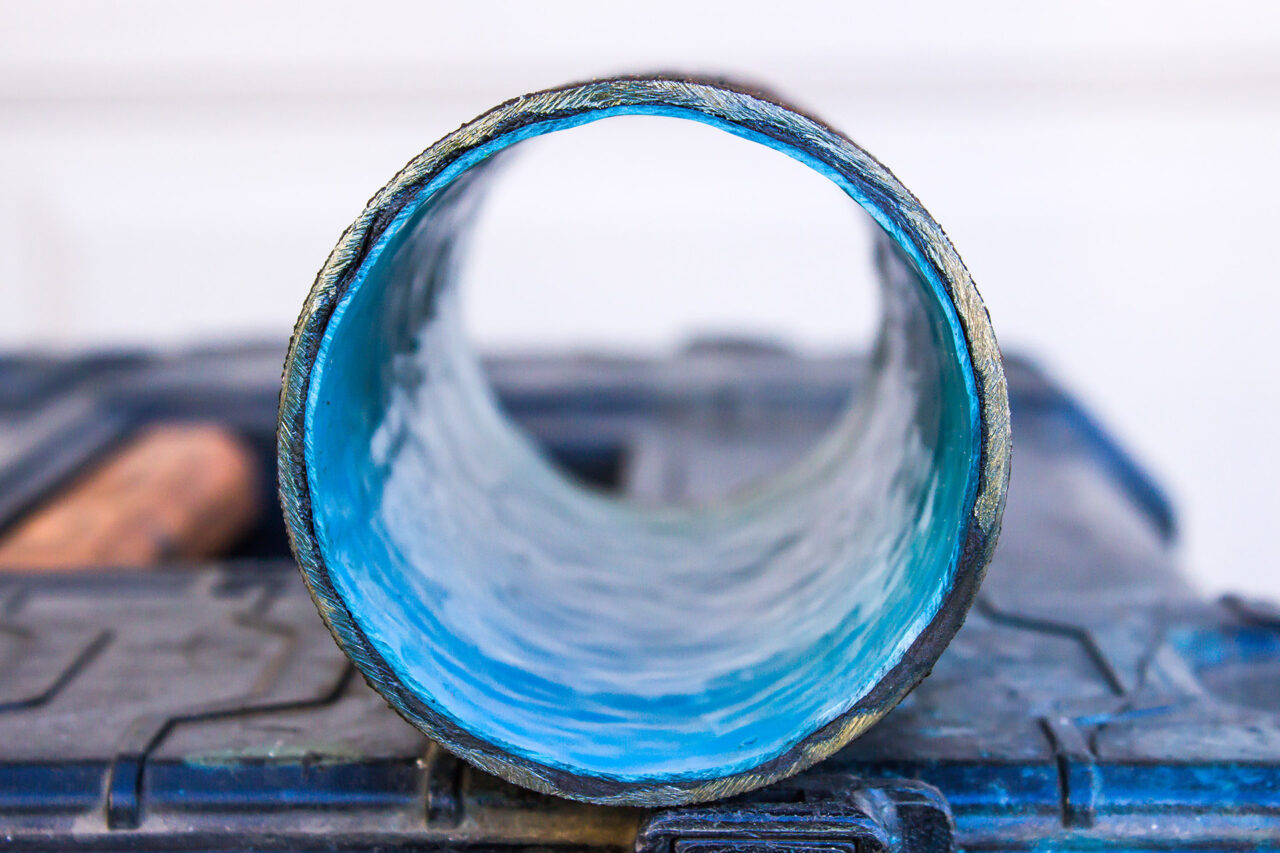
After descaling the application of an epoxy lining is recommended
After descaling with a carbide chain, it’s important to take additional steps to maintain and extend the life of your sewer system. While descaling effectively removes significant buildup (up to 1 inch thick) from the inside of the pipes, significantly improving water flow and pressure (by up to 3 to 5 times), it also exposes the bare interior surfaces of the pipes. This makes them more susceptible to corrosion and deterioration.
Without additional protection, cleaned pipes can last only 1 to 5 years, depending on their condition. To ensure long-term durability, the application of an epoxy lining is highly recommended. Epoxy pipe lining involves coating the inside of pipes with a resin that cures to form a seamless, corrosion-resistant barrier. This method not only restores the structural integrity of the pipes but also extends their service life by up to 50 years.
Carbide Chain Descaling Prices from Almco Plumbing
At Almco Plumbing, we offer professional carbide chain descaling services to meet the needs of your sewer lines. Below are the approximate rates for this type of plumbing work.
| Type of Work | Average Price, $* |
|---|
| Kitchen ABS Pipe | $850–$1,200 |
| Kitchen Cast Iron | $1,100–$1,800 |
| Whole House Cast Iron Sewer Descale | $2,500–$4,000 |
| Cut Roots with Carbide Chain | $650–$1,200 |
*The above prices are for guidance only and do not constitute an offer.
Frequently Asked Questions (FAQ)
What is carbide chain descaling?
Carbide chain descaling is a pipe cleaning method that uses a rotating carbide-tipped chain to remove heavy deposits—such as rust, mineral scale, grease, sludge, and hardened scale—from the inside of pipes.
When is carbide chain descaling the best solution?
Carbide chain descaling is ideal when:
- Pipes have significant scale or corrosion buildup.
- Drains are experiencing reduced flow due to blockages.
- Pipes are being prepared for epoxy lining or other relining methods.
We highly recommend this method for residential homes with ABS or cast iron kitchen drains and for restaurants dealing with grease buildup in their drain pipes. It’s also effective for descaling storm drains, as well as both commercial and residential sewer systems, and clearing pipes affected by plant roots.
Can carbide chain descaling damage pipes?
While the process is safe for most pipes, it can damage severely corroded or structurally compromised pipes. It’s often difficult to detect cracks or sections of severely corroded pipe when there’s over 1” of buildup. Based on our camera inspection, we can estimate how successful the descaling will be.
Is carbide chain descaling effective on PVC, ABS or other plastic pipe?
Yes, carbide chain descaling is effective for PVC and plastic pipes. In these cases, we use a chain without carbide tips to prevent damage to the pipe.
Is carbide chain descaling messy or disruptive to property?
This trenchless process creates minimal mess when performed by professionals. Debris is removed using specialized vacuum extraction equipment, and the job is usually completed quickly to minimize disruption to your property.
How long does the process take?
The time required depends on the amount of buildup and the length of the pipe to be cleaned. On average, most projects are completed within a few hours to a day.
What types of pipe are best suited for carbide chain descaling?
Carbide chain descaling is ideal for cast iron pipes, particularly in older systems with significant scale or corrosion.
Is carbide chain descaling expensive?
Pricing for carbide chain descaling depends on the length and condition of the pipes. Almco Plumbing offers competitive rates for this service, ranging from $1,100 to $4,000 on average.
Does carbide chain descaling come with a warranty?
Yes, we offer a limited 1-year warranty for the service, provided the sewer is not subjected to misuse (e.g., throwing baby wipes, paper towels, or using non-standard cleaning tools).
Can descaling solve all pipe problems?
Descaling is very effective at removing debris and improving flow, but it cannot repair structural damage, cracks, or collapsed pipes. A professional inspection will help determine the best solution for your specific situation.
How do I order carbide chain descaling from Almco Plumbing?
You can contact Almco Plumbing by phone, email, or visit our office to schedule an inspection and discuss your descaling needs. For more information, visit the Contacts page. You can also book a carbide chain descaling service directly through the Booking page.
